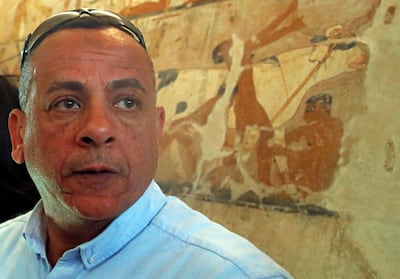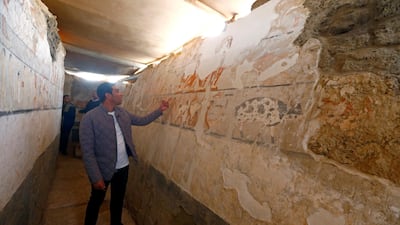Egypt has unveiled a 4,400-year-old tomb discovered near the country's famed pyramids at the Giza plateau just outside Cairo, a find that authorities hope will help revive the country's staggering tourism sector.
The tomb is in a wider area of Giza's western necropolis, which is known to be home to tombs from the Old Kingdom from 2686–2181 BC.
It probably belonged to a woman known as Hetpet, who archaeologists believe was close to ancient Egyptian royals of the 5th Dynasty.
The tomb, unveiled to the media on Saturday, is made of mud brick and includes wall paintings in good condition that depict Hetpet observing different hunting and fishing scenes.
Other scenes depict a monkey, a common pet in pharaonic times, picking fruit. Similar scenes have been found in other tombs belonging to the later 12th dynasty, the Antiquities Ministry said. Another scene shows a monkey dancing before an orchestra.
The ministry said the archaeological mission behind the discovery began excavation work last October. Archaeologists have been making discoveries near the site since the 19th century, and Mostafa Al Waziri, who led the mission, believes there is still more to be found.
"This is a very promising area. We expect to find more," Mr Al Waziri said. "We have removed between 250-300 cubic metres of layers of earth to find the tomb.
"What we see above the earth's surface in Egypt doesn't exceed 40 per cent of what the core holds."

Mr Al Waziri believes Hetpet had another tomb in Giza's western necropolis and said excavation work is under way to find that one too.
Hetpet is a known figure in Egyptian antiquity although her mummy has not been discovered. Fragments of artefacts belonging to her were found in the same area in 1909, and were moved to a museum in Berlin at the time, Antiquities Minister Khaled Al Anani said.
Despite all the discoveries already made about ancient Egypt, experts say they hope to find many more treasures still buried under the vast desert — in part thanks to modern technology.
The area of the latest discovery is close to a new museum under construction that will house some of Egypt's most unique and precious artefacts, including many belonging to the famed boy king Tutankhamun.
The first phase of Grand Egyptian Museum is expected to be opened later this year while the grand opening is planned for 2022.
In January, Egypt placed the ancient statue of one of its most famous pharaohs, Ramses II, in the museum's atrium, which will hold 43 massive statues.
Throughout 2017, the Antiquities Ministry made a string of discoveries across Egypt — including some in the southern city Luxor known for its spectacular temples and tombs spanning different dynasties of ancient Egyptian history.
Egypt hopes the inauguration of the new museum, along with the recent discoveries, will draw visitors back to the country. Egypt's vital tourism sector has been hit hard by extremist attacks and political turmoil following the 2011 popular uprising that toppled longtime autocrat Hosni Mubarak.
The government has tightened security around archaeological and tourist sites and spent millions of dollars to upgrade airport security, especially following the 2015 downing of a Russian airliner by ISIL, killing 224 people on board.
Russia suspended flights to and from Egypt after the bombing, but Russian flights to Cairo are due to resume this month after the two countries signed a security protocol in December.
_______________
Read more:
Mysterious plane-sized 'void' discovered in Great Pyramid of Giza
Egypt’s pyramids to share stage with pharaoh’s boats
The five gifts Louvre Abu Dhabi offers to the UAE and the world

